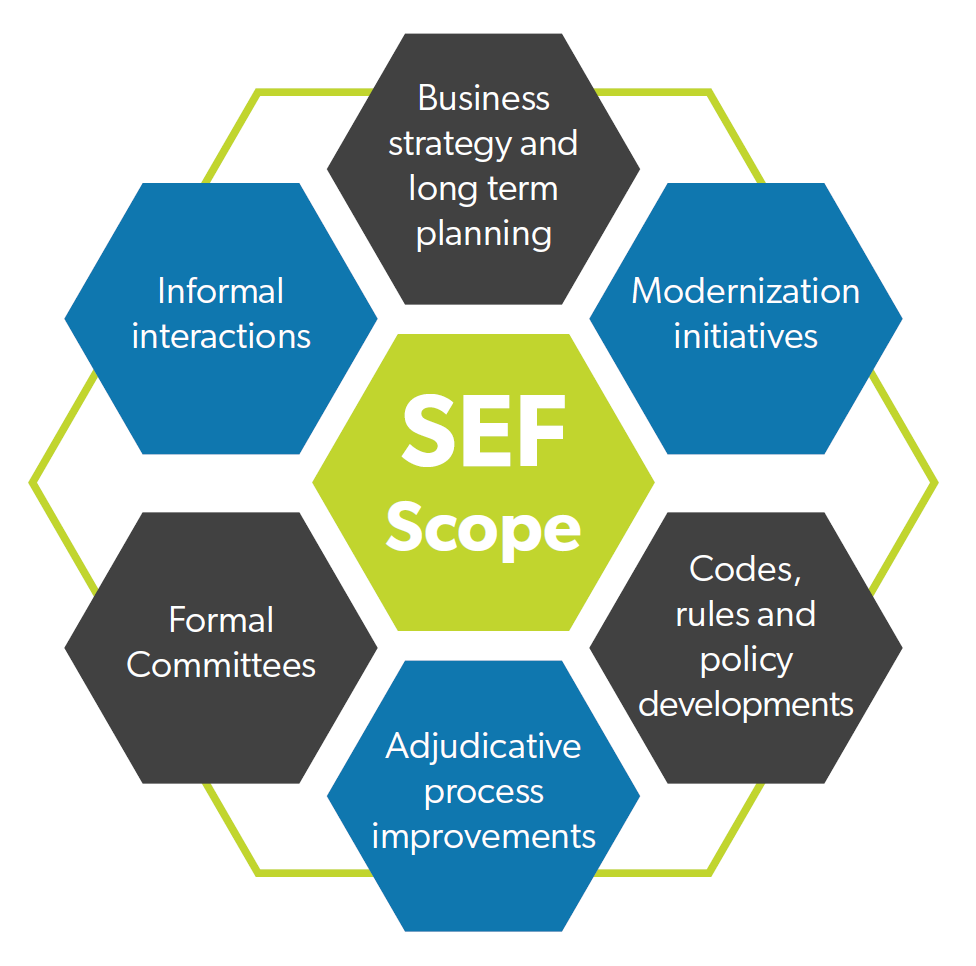To ensure a growing economy and improved quality of life for all Ontarians, the OEB must have the trust of the regulated community, the consumers we serve and the elected representatives to which we are accountable. In particular, sector stakeholders and intervenors make a significant contribution to the work of the OEB through ongoing adjudicative and policy consultation processes and established advisory committees.
Jump down:
Stakeholder Engagement Framework
Launched in May 2021, the Stakeholder Engagement Framework (SEF) is a guide for the OEB’s go-forward approach, and a response to recommendations from the 2018 OEB Modernization Review Panel Report, the 2020 Mandate Letters issued to the OEB by the then-Ministry of Energy, Northern Development and Mines, the OEB’s 2020 Ipsos Stakeholder Survey and the OEB’s 2021 Top Quartile Regulator Report. Each of these documents recommends the OEB develop our work through transparent and inclusive consultation processes.
The SEF is designed to align programs and activities with OEB priorities, promote transparency and accountability in policy making, consider and manage stakeholder fatigue and deliver value for money for the people of Ontario.
- Read the full Stakeholder Engagement Framework (pdf)
- Track the progress we're making to deliver on our stakeholder engagement commitments.
Commitment
The OEB’s stakeholder engagement framework will ensure accessible and fair participation that is transparent, well planned and efficiently coordinated. The OEB will provide clear objectives, opportunities for meaningful input, and will listen, hear and incorporate feedback into our work.
Furthermore, the OEB will seek feedback on our engagement approaches to refine and continuously improve.
Purpose
The OEB engages with stakeholders to build mutually beneficial, enduring and trusted relationships with those affected by our work. Engagement is an integral part of the OEB’s ability to execute our mandate, gain insights and deliver sound policy decisions that support sector sustainability and innovation, Ontario’s economy and to protect consumers and provide public value.
The implementation of the SEF will bring good governance, better coordination, implementation of enhanced tools and improved coordination to the OEB’s engagement approach.
| Governance | Coordination | Tools | Communication |
|---|---|---|---|
|
Provide enterprise- wide governance on OEB’s approach to stakeholder engagement
Evaluate practices for continual improvement |
Better ensure coordination of efforts, reduce burden and find efficiencies | Implement tools to determine which stakeholders need to be involved based on potential impacts to their priorities and values, ensure fairness and manage fatigue | Improve communication with stakeholders regarding status of processes that can be challenging due to lengthy and uncertain timelines |
Who does the OEB engage with?
Engaging with stakeholders is an important part of what we do in performing our mandate. As depicted in the below, our stakeholder universe is broad as we engage with a wide variety of interests.
| Consumers | As customers |
|---|---|
| Governments | Federal, Provincial, Municipal, Indigenous |
| Intervenors/ Associations/ Interest Groups | Energy/Special interests, Opinion Leaders & Academics Communities (Municipal; Provincial, Shareholders) |
| Regulated Entities Partners |
Electricity and Gas Distributors, Generators, Transmitters, Electricity Storage, Retailers, Marketers, Unit Sub-Meter Providers, IESO |
The OEB recognizes that not every stakeholder may want or will be able to input at each point but the OEB will make every effort to enable broad-based participation that is as diverse as Ontario and its energy sector.
Key Points of Engagement
Stakeholder engagement provides a positive contribution at every stage of the OEB’s work, from strategic planning to supporting the individual consumer. While engagement will often be project based, the OEB aims to have an ongoing dialogue with its stakeholders. The scope of the SEF is broad and comprehensive. It will be applied to all of these areas.

Stakeholder and Consumer Advisory Groups
The OEB is committed to engaging with stakeholders in a meaningful way in order to obtain diverse perspectives on matters of importance, while building trust and enhancing transparency. One way we are doing this is through advisory groups that will provide advice, perspective and feedback.
- OEB Energy [X] Change (visit Engage with Us)
- Adjudicative Modernization Committee (visit Engage with Us)
- Ontario Pipeline Coordinating Committee (visit Engage with Us)
- Policy Day: Charting the Path to Top Quartile Regulator (visit Engage with Us)
- Consumer Panel
The OEB also regularly convenes working groups with stakeholders on ongoing policy consultations.